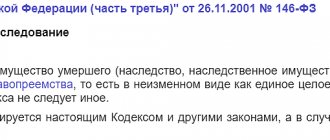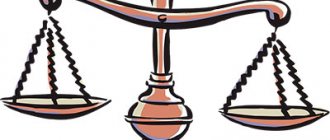For what reasons can the bank take away the apartment?
If the mortgage loan amount has not yet been fully repaid, the lender may demand that the owner of the apartment taken on credit return it to the bank. Such bank actions are possible if the borrower:
- violates contract terms
. In accordance with the law on mortgages, such actions by a credit institution are possible if it becomes known that the client has mortgaged the property to another lender without its knowledge; - violated the rules for repairing living space
or if, due to his negligence, the apartment became unsuitable for living in; - violated home insurance obligations
; - decided to sell the apartment
without obtaining permission from the bank for these actions; - did not make monthly payments for 3 months
more than 3 times during the year; - has mortgage debt
amounting (in practice) to over 80% of the cost of the loan apartment.
If housing is more expensive than debt?
“In practice, situations most often arise in which the amount of debt is much less than the value of the property.
In such cases, after the sale of real estate, the bailiffs return the remaining funds to the debtor. The main thing you need to remember is that you can’t just sell an apartment. There is a rule according to which the price indicated in the court decision (at market value) falls by 5, and after that by 10 percent,” notes Elena Krivonosova, lawyer at the legal service “Unified Center for Protection.” If there are funds left after the sale of housing, they will go to the account of the bailiff service. These funds are used to cover the costs of selling real estate (services) and other expenses for conducting enforcement proceedings (for example, enforcement fees), after which the remaining funds are transferred to the debtor’s account.
When applying for a loan, you need to soberly calculate your strength. If force majeure situations occur, you must immediately contact the bank.
Unlock access to the private part of Clerk with a Premium subscription. Get hundreds of webinars and online courses, unlimited consultations and other proprietary content for accountants.
Hurry up to subscribe with a 20% discount until October 15, 2021. Read more about “Premium” here.
Is it possible to evict a large family?
If the family living in the mortgaged apartment has many children, the judicial authority may take the side of the defendant, but in accordance with legislative norms, the status of having many children is not a basis for mitigating the decision to evict the debtor and his family members from this living space.
If the square meters purchased on credit are the only ones, and minor children live in it, the court has the right to issue an order to the borrower not to evict from it. This allows the court to establish a moratorium on the seizure of real estate for one year.
The borrower will have to begin immediately repaying the debts on the loan and pay off any overdue payments on time. If after a year the mortgage debts are not paid, the bank has every right to evict a large family from such housing.
All cases when bailiffs can actually seize real estate
Seizure of real estate is possible under the following conditions:
- If the debtor still owns the property or other housing. It could even be a room or share in a communal apartment.
- The amount that the citizen did not pay is slightly less than the total cost of the apartment.
- There is a decree from the courts or a notary.
What to do if you are illegally evicted from an apartment - privatized, municipal, rented, hostel?
The ban is imposed on actions with the apartment that the owner can perform - for example, sell, donate, bequeath.
The bailiff can impose a seizure so that the owner cannot dispose of the housing. There are no other purposes for seizing real estate.
Can a small child be evicted from a mortgaged apartment?
If the holder of the pledge applies to the court to collect funds for the property being pledged, he has the right, by decision of the court, to evict the owners of such housing without taking into account any circumstances. Property, according to the law, is collateral and must be transferred to the creditor to pay debts.
Eviction of a family with a minor child from a mortgaged apartment is legal. If there is a debt to the lender, the mortgage loan agreement is terminated, the bank evicts everyone who lives in such an apartment along with a minor child. The presence of minor children does not prevent the creditor from exercising the right to receive his funds back. The bailiff, in accordance with the existing court decision, must remove the children from registration with the Federal Migration Service.
The bank is not obliged to provide alternative housing to a minor child. In this case, the debtor has one option - to contact the municipal authorities in order to recognize him as poor.
The state can help provide social housing under one of the state programs.
Can they take away their only home if it has a mortgage?
If the housing was purchased using mortgage funds and is collateral, then, unfortunately, the bank has the right to take it away. Consequently, the creditor has the right to take the apartment for debts if it is mortgaged and even if it is the only one.
Moreover, creditors can take the apartment for debts, even if a child is registered in it.
It is worth considering that it is not profitable for the bank to take away an apartment, and even more so a house, to pay off debts, since it is necessary to spend time and money on the sale of this property.
Therefore, if difficulties arise with the fulfillment of obligations, it is necessary to urgently contact the lender. In most cases, the bank will accommodate you halfway and offer, for example, to reduce monthly payments by increasing the mortgage term. “In this situation, it is advisable to contact the bank that provided the loan with an application for debt restructuring. In practice, the bank is often not interested in the judicial procedure of foreclosure on a mortgaged apartment, since this is a rather lengthy process. Therefore, if you intend to repay the debt in the future and justify the plan for restructuring your debt, there is a possibility that the bank will meet you halfway and agree on a new debt repayment schedule,” advises Konstantin Zautrennikov, leading lawyer.
Is it possible to evict disabled people?
A disabled person can be evicted for mortgage debts in accordance with legal grounds. If the mortgaged living space is to be sold by the bank, its owner will be changed. The new owner of the property has every right to expel all citizens living in the living space he purchased. It does not matter whether the residents are citizens with disabilities or minor children.
Funds from the sale of mortgage real estate will be used to pay off the debt, unpaid interest, and costs of participating in the trial. The remaining amount must be returned to the borrower. If these funds are sufficient, you can use them to purchase housing that has a lower price.
Seizure of a single apartment for debts – who can actually take the property and when?
Based on the new bill - which, by the way, has not yet been adopted - the court has the right to decide that the arrest and sale of the only apartment is possible.
In this case, it is taken into account whether it is true that it is impossible to fulfill debt obligations by any other means.
Until the bill is adopted, such actions by the judiciary will be illegal. Therefore, debtors have nothing to worry about for now.
The question of whether the bill will be adopted remains open. Many State Duma chairmen oppose his approval. But, if the law does come into effect, then the debtor who owns one piece of real estate will repay the debts through the arrest and sale of the only home.
The procedure for arrest and sale is normal. The bailiff is in charge of documentation. Before placing a lien on the property, he will have to obtain a court order.
The features are that:
- The court may order the property to be seized and ordered to be sold, while setting a minimum amount that the debtor will have to receive in order to purchase new property.
- The new property will have to comply with the requirements and standards established by regional legislation.
- A citizen does not have the right to be evicted to the street.
- An expert will determine the cost of the apartment.
- It is taken into account whether there are other family members who also need housing.
- The lender has the right to purchase the property within 7 days.
- After 10 days, the property can be put up for auction. The cost will be the same. Repeated auctions are possible without reducing the initial price. They are carried out after 1 month.
- After selling your home, you must vacate it within 2 weeks.
Until the new law is adopted, Article 446 of the RF Housing Code is in effect. It is necessary to rely on it when considering this issue.
Remember that land or surplus real estate cannot yet be collected for debts, since this is not approved in any Russian law.
Participation of the prosecutor in the process
The prosecutor can take part in resolving disputes in accordance with Article 45 of the Code of Civil Procedure of the Russian Federation. Like guardianship authorities, he is not vested with the right to cancel or delay the eviction of minors from mortgaged housing. This possibility may arise if it is determined that there were violations on the part of the bank. But every year there are fewer such precedents, since mortgages are one of the most popular types of loans that bring decent income to lenders. Lawyers working in banking institutions have already accumulated extensive experience in matters related to working with debtors and their eviction from mortgaged housing. Therefore, in most cases they are well prepared for litigation and in most cases they win in court. The prosecutor takes part in the court as an observer, and cannot help the debtor, whether he has children or a disabled person in the family, stay in the mortgaged housing.
Who can seize an apartment?
Only a bailiff has the right to seize and sell real estate on the basis of a decision made by a court or a writ of execution made by a notary. Threats from banks or collectors that they will come, seize the apartment and throw all the residents out onto the street are nothing more than a way of intimidating a person to pay off the debt as quickly as possible. You need to know that first the bailiff seizes the debtor’s funds, and only if this amount is not enough, he seizes other property that the person owns. The exception is sheets of foreclosure on mortgaged property. According to them, the bailiff can immediately place a lock on housing provided by a person as collateral to receive money on a loan.
In what cases can a bailiff seize real estate?
First, the debtor receives from the bailiff a decree banning the apartment or from a Federal Reserve employee a notice of seizure of the residential premises. A bailiff can impose a ban on an apartment that is the only one suitable for a person and his family to live in only with the goal of preventing the debtor from getting rid of the apartment (sell, donate, bequeath, etc.), without subsequent sale. If a person owns several residential premises, then the bailiff has the right to seize the property and subsequently sell it. However, two mandatory conditions must be met:
-The debtor owns two or more residential premises.
-The amount of debt is not much less than the cost of the apartment.
Seizure of a share in the right of ownership of housing
If a person has several residential premises in common shared ownership, the bailiff can seize the share in one of the apartments. To do this, the bailiff applies to the court to seize the debt to pay off the debt. The judge allocates the share that belongs to the person “in kind”, i.e. indicates in the decision which specific part of the apartment belongs to the debtor, its area and purpose. Having received the relevant document, the bailiff draws up a deed and a decree of seizure for the subsequent sale of the property.
If a minor lives in the apartment
It is possible to sell real estate if a minor is registered there only with the written consent of the guardianship authority.
When deciding on the issue of foreclosure on an apartment in court, a representative of the guardianship authority is invited, and, taking into account the circumstances of the case and his opinion, a decision is made. According to Article 292 of the Civil Code of the Russian Federation, as soon as an apartment becomes the property of another person, family members of the previous owner lose all rights to this housing.
For example: the court decided to foreclose on an apartment in which a mother and her child lived. The guardianship gave permission to sell this apartment, because... the child was not its owner and they had another apartment, the owner of which was a minor. Next, the bailiff arrested her. As a result of the auction, a new citizen became the owner of the apartment. After receiving a certificate of state registration of ownership from the Federal Reserve System, the new owner has the right to evict the mother and child from the occupied apartment.
The bailiff can seize housing not only for non-payment of alimony and utility bills, but also for compensation for harm to health, moral damage, taxes, etc., provided, as already mentioned, that the debtor owns several apartments and the amount of the debt is proportional to the price of the premises. Therefore, it is better not to hide from creditors and bailiffs, but to try to resolve issues on mutually beneficial terms
Based on materials from “Legal Consultations”










